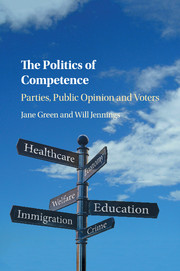Book contents
- The Politics of Competence
- The Politics of Competence
- Copyright page
- Dedication
- Contents
- Tables
- Figures
- Acknowledgements
- 1 Introduction
- 2 Conceptual Problems and Solutions
- 3 Three Concepts of Issue Competence
- 4 Explaining Issue Ownership Change
- 5 Government Performance and Oppositions
- 6 Generalised Competence and the Costs of Governing
- 7 Ownership, Performance, Generalised Competence and the Vote
- 8 Conclusion
- Appendices
- Bibliography
- Index
4 - Explaining Issue Ownership Change
Published online by Cambridge University Press: 28 September 2017
- The Politics of Competence
- The Politics of Competence
- Copyright page
- Dedication
- Contents
- Tables
- Figures
- Acknowledgements
- 1 Introduction
- 2 Conceptual Problems and Solutions
- 3 Three Concepts of Issue Competence
- 4 Explaining Issue Ownership Change
- 5 Government Performance and Oppositions
- 6 Generalised Competence and the Costs of Governing
- 7 Ownership, Performance, Generalised Competence and the Vote
- 8 Conclusion
- Appendices
- Bibliography
- Index
Summary
- Type
- Chapter
- Information
- The Politics of CompetenceParties, Public Opinion and Voters, pp. 47 - 93Publisher: Cambridge University PressPrint publication year: 2017



